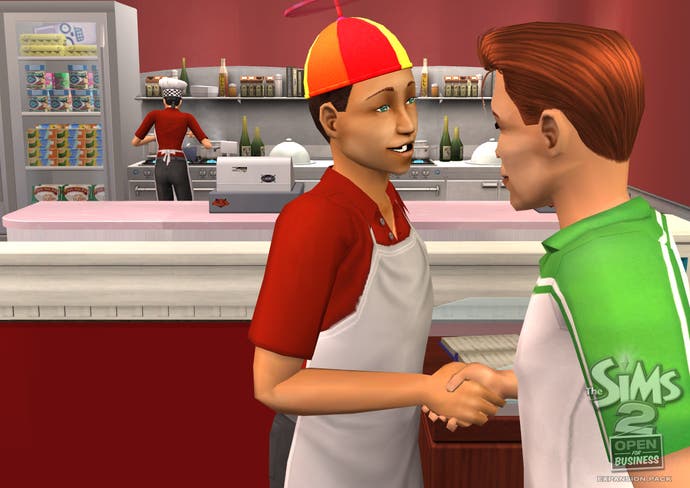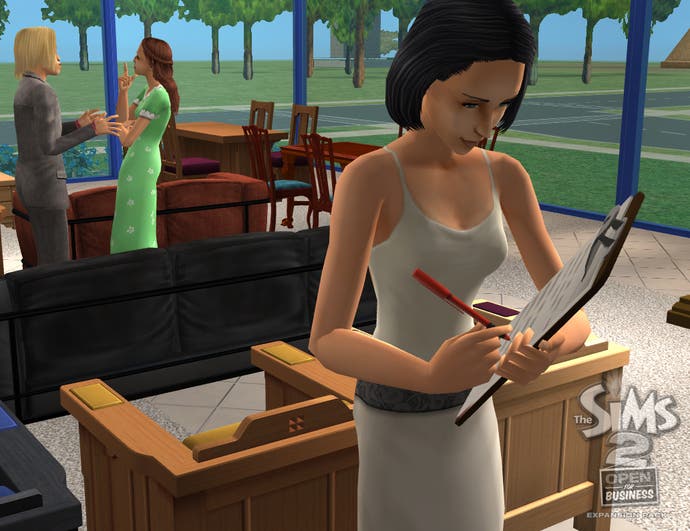The Sims 2: Open For Business
Sale.
Oh-ho. I see what they've done here. Creating a game about working for the only group of workers in my line of sight (I'm sitting opposite a mirror) who actually enjoy waking up in the morning. Very clever! And they would have gotten away with it too, but I just punched myself in the face and remembered I think Open For Business is good anyway and if there's any wool in front of my eyes it's only because I was in the north of England yesterday and feel asleep and was probably attacked by a sheep. I hate sheep. Stupid feet.
Anyway, this is the third expansion for the second in EA's never-endingly popular Sims series, and adds a surprisingly significant chunk of new game, allowing you to start a business (either as an extension of your home or on a community lot) and use it to augment or even replace your regular job income. As part of this you get to manage staff and feel more directly responsibility for your sims' finances, you gain new skills and perks, and of course you gain access to a great range of new items (125 in total).

Unfortunately things don't begin too brightly, as for some reason Maxis' usual measure of what's intuitive is a bit off centre, and so you'll find yourself getting confused over how to call staff to work once you've hired them, what to do about the clientele when it gets to closing time, why customers in the little shop attached to your house keep popping into the rest of it and watching TV, and other fiddly things like how to restock and the way the game uses a flippable 'open/closed' sign to manually control business hours.
The good news is that you soon have no trouble doing whatever it is you want to do, leaving you to focus on doing it - and you can do plenty. There are three central types of business, allowing you to sell goods or services, or charge for something by the hour. Once you've installed a cash till to handle transactions and put up an open/closed sign, you're up and running, and you can have toy shops, hair-dressers, delicatessens, clothes stores, gymnasiums - whatever - and owners of previous expansions Nightlife and University will find themselves with an even broader range, including night-spots.

At first it's quite expensive - your stock isn't free, and nor is the space you're using to sell, so trying to get going with a dedicated shop from day one is a bit unlikely - but assuming you have a couple of sims working regular jobs you can usually keep things ticking over financially by making sure one of them's on a decent career trick outside the family business. On the shop floor (assuming you go for a shop, obviously), there are plenty of micromanagement options - you can do little targeted sales pitches, go around replenishing stock, etc. - and after a while you can bring in staff who'll take direction from you and give you a chance to take care of the usual cocktail of bladder/hygiene/sexual tension in the next room. As you build customer loyalty by making sure stock's up to date and the place is easily navigable and so on, or applying that personal sales touch, you can even get away with fiddling the prices upward a bit.
All sounds fairly straightforward, and it is, but then that's the idea: you're meant to be able to get a business up and running so that you can enjoy running it, revelling in the silly little animations (like the mess your staff makes of trying to do sales pitches, or the sight of a neglected shopper hurling his bags to the floor), perfecting the look with giant knights in shining armour (or whatever tops up your club card points), and trying to rank up your various talent badges and skills, which can also help building relationships at home. That said, talent badges, while they appear quite transparent in a business context (a sales badge improves sales technique, etc. - and morale-boosting has an across-the-board effect on employees), in trying to influence areas outside work they introduce an additional layer of complexity on top of existing systems that puzzles a little. I know it's meant to be helping me; I just can't always figure out how or why.

No matter though, because running a business is entertaining in and of itself - not least because things like robot-making offer the handy bonus of, well, allowing you to create your own cake-baking robot pals to use around the home and garden. It's the little moments of levity and surprise that sustain The Sims 2, and Open For Business has plenty.
Nobody who doesn't already own The Sims 2 is going to find themselves converted by Open For Business's 'Tycoon Lite' approach to building a retail or service empire (or a hairdressers' called 'Snip - Ed'), but for those of you enlightened enough to pick up the original game but guarded enough not to have splurged on any of the expansions yet, it might be worthwhile. And of course anybody with an actual Sims fetish will love it to bits. Granted it can be fiddly and confusing to start with (why hide so much of the critical new stuff in the depths of the catalogue?), but once you're up and running there's a definite attraction to it. After The Sims 2 let people satisfy their need to build up pointless little domestic kingdoms, Open For Business helps stretch the borders rather than just broadening the comfort zones, which arguably makes it a better expansion than most.

